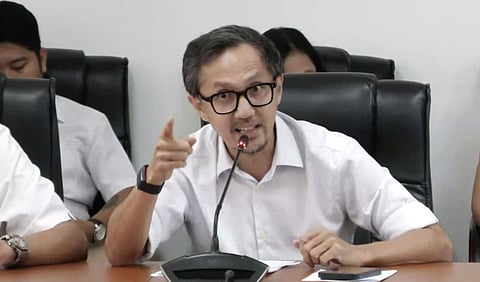
- NEWS
- the EDIT
- COMMENTARY
- BUSINESS
- LIFE
- SHOW
- ACTION
- GLOBAL GOALS
- SNAPS
- DYARYO TIRADA
- MORE

Amid a week of road tragedies, Department of Transportation (DOTr) Secretary Vince Dizon on Monday admitted what many Filipinos have long feared: the country’s roads are no longer safe, and the system meant to protect the public is broken.
In a joint press conference with the Land Transportation Franchising and Regulatory Board (LTFRB), Dizon faced the public not only to offer condolences but also to deliver a firm message of government accountability, urgency, and sweeping reform.
“People like you and me, all of us here — feel unsafe on our own roads,” Dizon said, visibly emotional. “That is the sad reality.”
The statement came after a string of fatal road accidents, beginning with a Solid North bus that plowed into vehicles along SCTEX, killing 10 people, including four young children from a church group. Just days later, a Ford Everest SUV rammed into a family on their way to send off an overseas worker at the Ninoy Aquino International Airport. The father survived. His five-year-old daughter did not.
“This could've been avoided accidents,” Dizon said. “Justice must not end with compensation or criminal charges... True justice is fixing a system that’s broken," he said in Filipino.
Speaking on behalf of President Ferdinand Marcos Jr., Dizon said he has been tasked to act decisively. He vowed that the DOTr — in collaboration with the LTO, LTFRB, and other agencies — would roll out immediate and long-term reforms focused on road safety.
Among the key measures announced is mandatory drug testing for all public utility vehicle (PUV) drivers, effective immediately. All drivers must now undergo drug tests every 90 days, in coordination with the Philippine Drug Enforcement Agency (PDEA).
The department will also enforce stricter driving time limits. Current rules allowing six consecutive hours of driving will be revised to four hours, with mandatory alternate drivers required for long-distance trips. Conductors acting as relief drivers will no longer be allowed.
Dizon acknowledged that many public vehicles pass inspections despite being unfit for the road. He directed the LTO and LTFRB to implement rigorous, internationally benchmarked inspection protocols — and suggested outsourcing inspections if government resources are insufficient.
He also called for a major overhaul of driver education. Current driving tests, particularly for heavy vehicles such as buses and trucks, were described by Dizon as inadequate. “Atras-abante lang,” he quipped, pushing for comprehensive retraining and evaluation.
Additionally, abusive drivers caught on video — including influencers — will face automatic 90-day license suspensions. “Wala akong pakialam kung may isang milyon kang followers,” Dizon warned. “Pag may nakita kami na may video na may pruweba na umaabuso kayo sa kalye, suspendido kayo. Automatic.”
("I don't care if you have one million followers. If we see a video of you abusing the road, you are suspended.")
He also demanded the immediate enforcement of the speed limiter law. Furthermore, Dizon threw his full support behind a Senate proposal to create an independent agency, the Public Transport Safety Board, which would focus solely on transportation safety across land, air, and sea.
